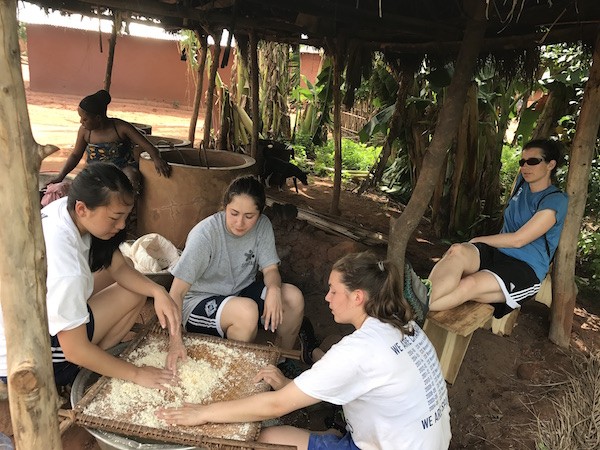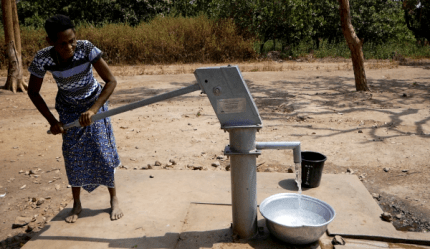
In Benin, when visitors come to your village, you welcome them by offering a drink of water. The village of Wession Camp Peulh in Northern Benin had a problem with this custom. The only water they had available was dirty and unsafe to drink. They would collect it from holes that they dug in the ground, out in the bushes, and scoop it out into buckets to carry back to their village. It would cause sickness and disease for the community, but it was their only water source so they had no other option but to drink it. But when visitors came through, they were ashamed to offer their dirty water to guests.
Since Global Aid Network (GAiN) Canada was able to drill a deep-capped water well in April 2018, the people of Wession Camp Peulh gained access to clean, safe water. The well is properly sealed with a hand pump that protects from contamination and allows for easy collection and distribution of the water.
In Benin, when visitors come to your village, you welcome them by offering a drink of water. The village of Wession Camp Peulh in Northern Benin had a problem with this custom. The only water they had available was dirty and unsafe to drink. They would collect it from holes that they dug in the ground, out in the bushes, and scoop it out into buckets to carry back to their village. It would cause sickness and disease for the community, but it was their only water source so they had no other option but to drink it. But when visitors came through, they were ashamed to offer their dirty water to guests.
Since Global Aid Network (GAiN) Canada was able to drill a deep-capped water well in April 2018, the people of Wession Camp Peulh gained access to clean, safe water. The well is properly sealed with a hand pump that protects from contamination and allows for easy collection and distribution of the water.
The women in this village are now proud to offer this new water to their guests. It is not only bringing health and economic stability to the community, it is also allowing them to flourish in their culture and customs.
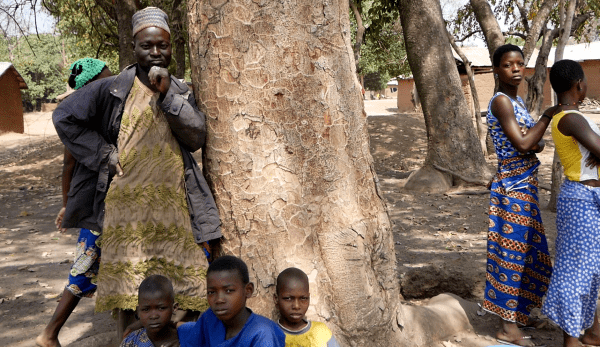
WERE YOU ENCOURAGED BY THIS STORY? SHARE THE STORY AND/OR LEAVE A COMMENT BELOW!
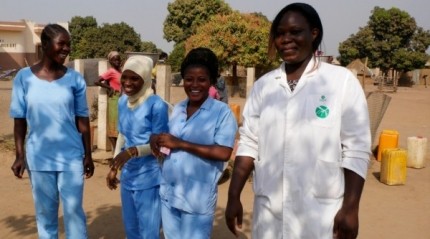
Elvie is the head medical doctor at the health centre in the village of Woria in Northern Benin. She runs a team of nurses to provide health services to the community. The team, more than anyone, knows how essential clean water is to health.
Clinic staff used to have to ride motorcycles to purchase water from the surrounding area – a challenging, time-consuming and expensive task. This arduous process caused many difficulties, especially during emergency situations.
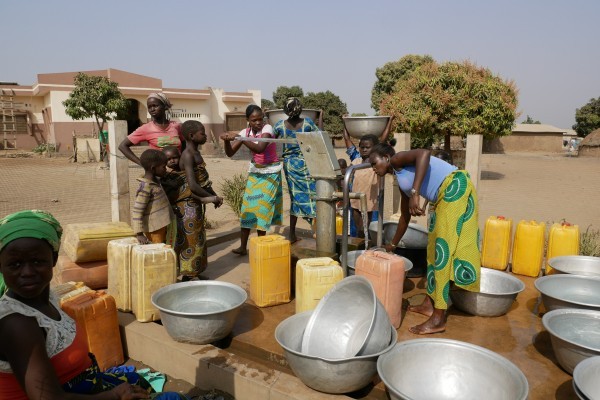
In July 2018, Global Aid Network (GAiN) was able to provide Woria with a deep-capped water well, right in front of the village health centre. Its location makes it a great benefit to the staff at the clinic and the community members that rely on the clinic’s services.
Health professionals at the clinic have witnessed how quick access to clean water has impacted the health of this community. They reported that cases of water-related disease have drastically decreased and the health of the population has greatly improved.
Not only is clean water improving health, but changes in hygiene and sanitation practices are playing a role in preventing the spread of diseases. After receiving the well, 137 people in the community attended a hygiene and sanitation training. The training is a facilitated discussion to target unhealthy practices and come up with ways to implement changes, such as proper hand washing with soap.
Because of the wholistic nature of our work, we partnered with the local church to show the JESUS film to the community. Two hundred and sixty-nine people attended the showing, where they got to see and hear about Jesus. Of the 269 who attended, 12 people made the decision to follow Jesus and seven attended a follow up.
WERE YOU ENCOURAGED BY THIS STORY? SHARE THE STORY AND/OR LEAVE A COMMENT BELOW!
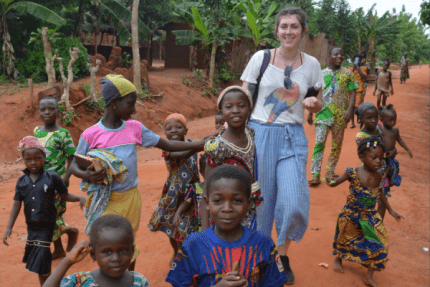
After spending a week in Benin on a LIFE Team Vision Trip with Global Aid Network (GAiN), Rachel Botma had visited enough villages to see the contrast between communities with access to clean water and those without.
“Just to see the enormous impact that having clean water has on a community was really something. You could really tell the difference between the communities with and without. Not just wells, but churches, too. There seemed to be so much more life, joy and vigour at the minimum.”
It was back in March 2019 that Rachel, along with her mother and four other team members, joined GAiN to Benin to see the work that is being done on the field through the Water for Life Initiative program.
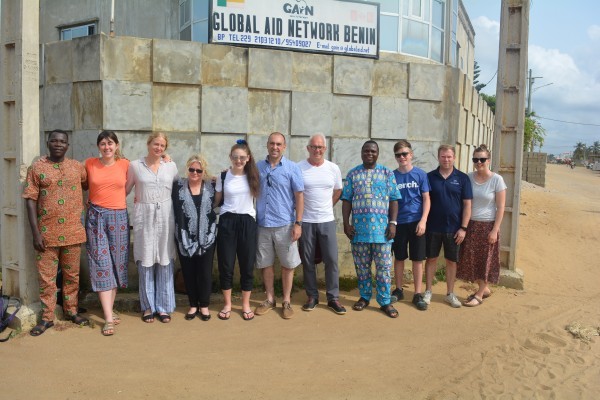
“I have been wanting to get involved in some kind of humanitarian project or volunteer for an NGO for quite a while but never found the right opportunity for me,” Rachel, explained. “Clean water and access to clean water is something that is near and dear to me; something I have been quite passionate about for some time. When I heard about the work that GAiN was doing, [providing] wells for underserved communities and villages, it was something that I knew I wanted to get involved with.”
With this being her first ever trip to Africa, and first trip to a developing country, Rachel signed up with no expectations. She quickly found herself shocked, but says it was a necessary shock.
“We pretty much jumped right into seeing the villages, which I think was really great because it jump-started a lot of powerful conversations and a lot of brainstorming. It was really wonderful for me to pick the brains and hear others pick the brains of some movers and shakers in the humanitarian space. It was quite inspirational for me.”
She recalled the first village they visited, Guede Codji, which was the first village to receive a deep-capped water well from GAiN in 2005.

The team learned about how a lack of clean water exacerbates gender inequality in places like Benin, where women and girls have to give up educational and career opportunities because they are tasked with fetching water for the family. In places where a water source is a few kilometres away, women are often put in danger situations must risk their safety to get water that is contaminated.
“Often these women get sexually assaulted on their journeys for water. That to me was such a horrible reality because they don’t have a choice and they have to put themselves in jeopardy every single day.”
An encounter with a local teenage girl and her father really stuck with her and highlighted the gender inequality issue even more.
“Another conversation that really stood out to me as a huge cultural issue is just how much the girls are expected to work, and how the men just don’t see a problem with it. The most extreme situation we saw was with this 16 year-old girl, Clarice, and her father. When I first saw Clarice, I said to my mother, ‘Wow, that young girl must be nine months pregnant with twins.’ Turns out, she has sclerosis of the liver.”
There was another team member on the trip, named Abel, who happened to be a doctor and was able to talk to Clarice’s father about her medical history. It was her second time developing the condition. Abel advised Clarice to take it easy, telling her father not to let her carry anything heavy and to send her to a doctor. While Clarice and her father seemed to understand and agree, Rachel was very disappointed when she saw that not more than 15 minutes later, Clarice was carrying large pails of water over her head as her father watched on his bicycle.
“The point of this story is to show just what a woman or girl must endure without say, the expectations of them, their lack of rights, and also dignity,” Rachel explained.
Not only did Rachel witness gender inequality in the field, she also saw what the reality was like for villages without a clean water source versus villages with wells.
“One thing that really struck home for me was seeing the water source of one of the villages, which they called a river but was nothing more than a stagnant swamp — smell included. During our time there, we got to see a well constructed and become operational for that village. [It’s] crazy to think [that] what we take for granted, something as simple as water, can have such a huge impact.”
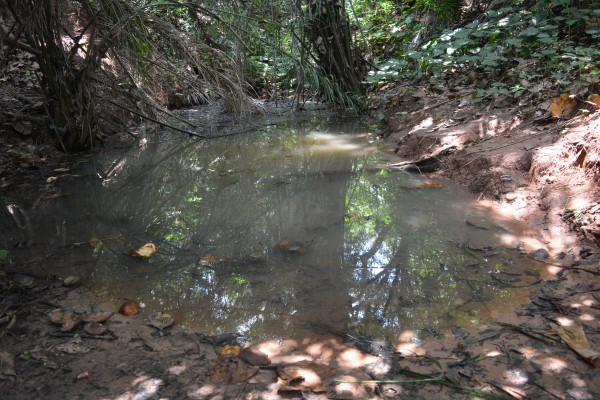
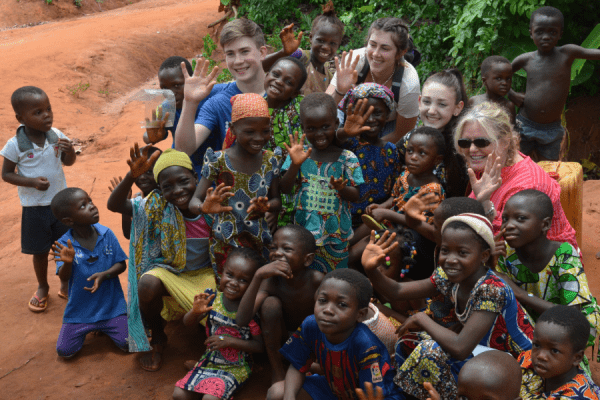
She observed that the impact of clean water was truly evident in the joy of the children.
“I noticed in the communities that had [deep-capped water] wells, the children were acting like children. They were silly and playful like children should be. In the villages without wells, and especially in the villages with a lot of voodoo (which you could really feel a dark, heavy spirit), the children seemed so lifeless. No emotion; no reaction to anything. I mean, comparing the two is almost a day and night difference.”
Although it was only a little over a week long, the trip provided Rachel with multiple learning opportunities, whether it was through speaking with villagers or GAiN staff from Canada or Benin.
“It was really encouraging to meet the GAiN staff. I mean, you could feel the blessing in the GAiN house, radiating off of the staff.”
The first full day consisted of a staff meeting, giving the team an opportunity to meet most of the staff, hear their testimonies and learn about the work that they do. They had the opportunity to dance and sing together and hear a message from Patrice Lavagnon, GAiN Benin country manager, and Ray Sawatsky, GAiN’s CEO and Executive Director.
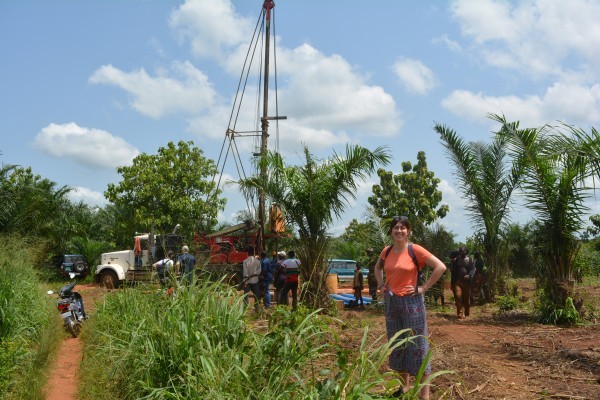

“We were able to see the community that has been built around GAiN. It was a wonderful experience. One that I had never been a part of before; non-traditional worship, and feeling its impact. It was a blessing for me to be a part of that and I am very thankful.”
And the vision trip was just the start of Rachel’s involvement with GAiN, as she hopes to stay involved in the future.
“I am interested in hearing about more opportunities for me to continue involvement whether it could be to go on another vision trip, volunteering or even employment. It is a smart organization, and one with the values that I can stand behind.”
ARE YOU INTERESTED IN GOING ON A LIFE TEAM VISION TRIP? CHECK OUT OUR UPCOMING LIFE TEAM VISION TRIP DATES.
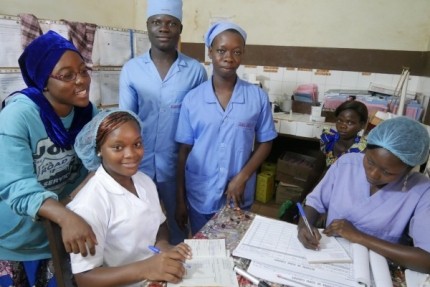
“The gender training has had a huge impact on our households,” one woman from the village of Fignonhou, Benin, told us after we had conducted a gender sensitivity training in her community. “There was a lot of quarrelling between husbands and wives before. Now, few people quarrel. Violence against women has decreased.”
When another woman first went to a hygiene and sanitation training put on by GAiN [as part of the Maternal Newborn Child Health (MNCH) project, in partnership with the Government of Canada] her husband was angry with her for going without his permission. However, when he noticed the useful information she was learning and how it improved their lives, he was happy to see her participate in more training and activities.
Sometimes it is these small improvements in women’s lives that give hope. When before, women were devalued and forbidden to take action and responsibility, now, they are now trusted and empowered to create change. They are given a new status within their homes and communities.
This year for International Development Week (IDW), the theme is “Together for Gender Equality.” Through our projects, one way that we aim to restore justice is by addressing gender inequality in the developing countries in which we work.
After 13 years of providing deep-capped water wells in remote areas, we’ve seen the power that clean water has to transform individuals and entire villages – not only to improve health but also the quality of life for women.
Over the last two years, we’ve been able to help mothers and children through the MNCH project by:
- Providing water wells in the village near medical clinics. This not only reduces diseases but also eases the burden of time and physical demands for women and girls, allowing them to attend school, focus on the needs of their families and other economic activities.
- Providing hygiene and sanitation education, as well as handwashing stations.
- Equipping village champions with the tools to promote proper hygiene and community health.
- Improving local health services by providing clinic trainings for village health workers to improve their skills.
- Empowering women through gender sensitivity training for both men and women. The goal is to foster healthy family relationships and ensure that the rights of women are better understood and respected, as their participation in decision making and control of resources is valued.
Learn more and see how you can join us in becoming change-makers in advancing gender equality in countries like Benin and Togo.
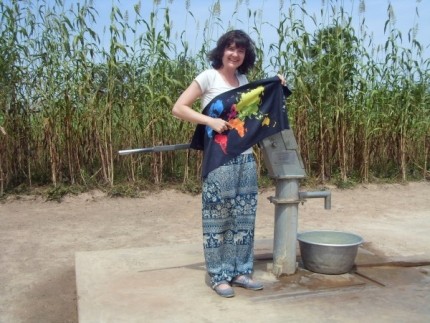
Q&A With Salome, WFLI Benin Vision Trip Participant
Salome from Germany recently participated in Global Aid Network (GAiN) Canada’s 2018 Benin Vision trip.
Q: How did you first hear about GAiN?
A: I heard about GAiN some years ago when my brother and his wife were involved in helping with one of GAiN Germany’s projects. They recommended that I go on one of GAiN’s mission trips and I ended up going on my first trip to Haiti with GAiN Germany in 2015.
Q: How did you end up hearing about the trip and what made you want to go?
A: In 2016, I sponsored a well for [Benin] through GAiN’s Water for Life Initiative. In 2017, I was informed that it had been assigned to a village in Benin. I was quite curious to see it with my own eyes – especially if there is really a plaque with my name on it. Unfortunately, GAiN Germany did not offer a trip to Benin, however, they let me know that GAiN Canada offers a vision trip. Thus, I contacted the Canadian office and was lucky to meet Lily, GAiN Canada’s LIFE Teams Manager. The trip was scheduled for the southern part of Benin (where the GAiN office and accommodation are located), however, my well was 600 km north. Lily and the GAiN Benin staff helped organize an individual three day trip for me to see my well in the north. Still, today, I appreciate their efforts.
Q: What did you do and see while on the trip?
A: We visited several small villages, every day seeing a different aspect of the Water for Life Initiative:
- Drilling of the well
- Flushing of the well (when an air compressor pushes the water out of the top of the well to clean out dirt and debris from drilling, causing clean water to spray out of the well)
- Watching presentations from GAiN partners DRIME (Disciples Ready in Mobile Evangelism) and The JESUS Film Church Planting Strategy
- Attending Hygiene and Sanitation Trainings
- Celebrating in a newly planted church and experiencing African worship
- Taking part in the weekly staff and prayer meetings
- Visiting the village that I had sponsored a well for [it is called Dipokor Fontri] and talking to the residents of the village
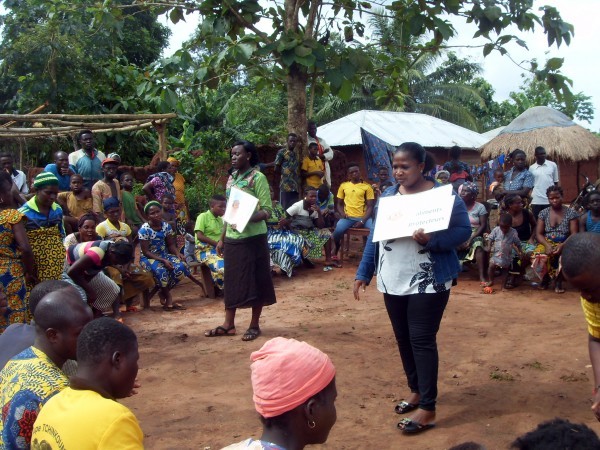
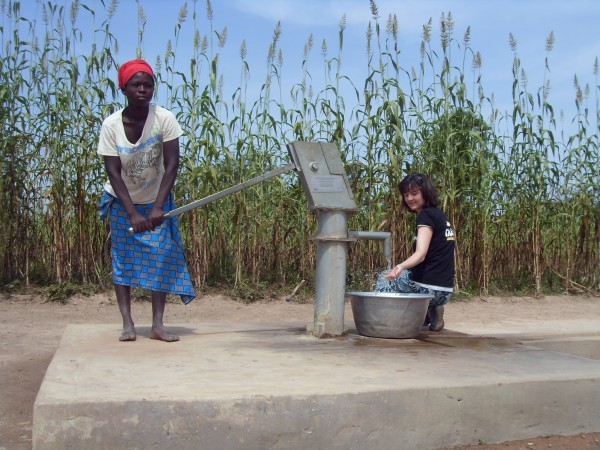
Q: How was the journey from the GAiN Benin office to the village of Dipokor Fontri?
A: The journey from the south (GAiN office) to the north (my well) and back was really exciting. It took me 11 hours one way and an additional hour for a repair stop because the car’s gas pump was malfunctioning. This was on the trip to the north and for a moment I thought I would never arrive at my destination. I sat in the shadow of the “open air garage” that we found along the way, and prayed while eight Africans cleaned the pump. Finally, it worked and we could continue on our trip.
Most of the distance was on a potholed asphalt road. Overtaking manoeuvres of heavy trucks and overloaded cars, as well as lane changes, caused me to close my eyes from time to time. On the other hand, I opened my eyes widely to catch all the sights of small villages, busy wives, simple markets on the roadside, churches, mosques and fields with interesting plants and much more. The closer we came to my village the more the road changed into a path and the last kilometer I had to walk through fields like a scout.
On this trip I was accompanied by a GAiN Benin staff member and a driver. Communication was in french. We had two overnight stays in a hotel, in the typical local style, in a quite big city three hours away from my village.
Q: What were some highlights of the trip?
A: Seeing how motivated, well-organized and dedicated the local staff is to demonstrating the love of God. Seeing the partnership of the JESUS Film Church Planting Strategy and seeing a screening of the JESUS film in the village. Visiting Dipokor Fontri. I got to see the impact that a well makes in the lives of the people and to talk to inhabitants of the village and see their gratefulness. As a present, they gave me 25 kg of sweet potatoes and yams from their fields. The chief of the village said: “We do not have a lot. But what we do have we would like to share with you.”
Q: How did you see God’s love demonstrated in the field?
A: I was encouraged to see the local staff live out love in everything they do. During drilling the GAiN staff sleeps in the huts among the villagers and not in hotels. This way they show humility and that they are just one of them. During weekly staff meetings the local staff not only pray for the work but also for the donors. The trainers are well prepared for the hygiene and sanitation trainings.
In partnership with the JESUS Film Church Planting Strategy, the staff involved contact local pastors before the drilling of a well and stay in contact with them after new people join the church.
Q: What were your expectations of the trip before they left and how were they compared to what you experienced?
A: I expected that we would see the well in some villages and hear the story of how it was constructed. My expectations were exceeded. I did not expect that I would be on spot to see a well being drilled and see the flushing of the well or see a showing of the JESUS film and attend a hygiene and sanitation training.
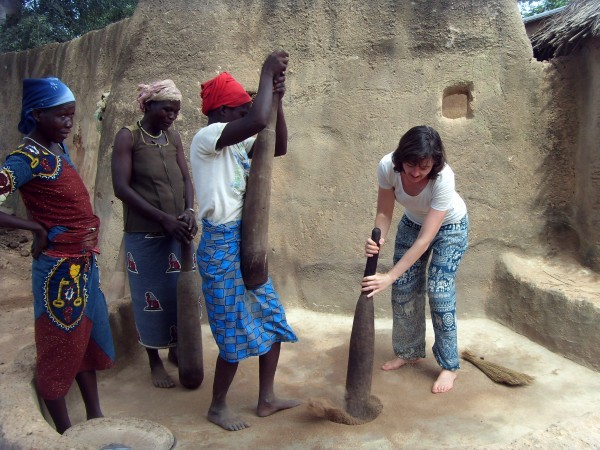
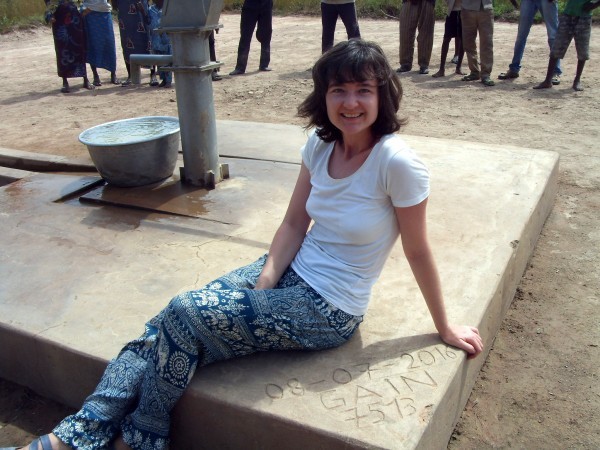
Q: Would you recommend that people go on a vision trip with GAiN?
A: Yes, I would definitely recommend going on a vision trip. It’s great to see the impact of a donation – not only from photos in an annual report but on site.
Q: Do you have any other experiences or comments that you would like to share?
A: I believe in Water for Life Initiative’s wholistic concept that includes the following:
- Providing wells- because clean water in the villages saves lives.
- Partnering with the JESUS Film Church Planting Strategy to share the message of God’s love and connect people to local churches and further resources for spiritual growth.
- Hygiene and Sanitation Training teaches people who have no access to education about proper hygiene habits and how to avoid diseases.
- Ensure maintenance of the wells by:
- Having a well committee in each village
- Training and equipment of regional technical staff for repairs
- Monitoring – staff regularly return to the villages to manage the wells and the work of the committee (this guarantees the functioning of the well for long-term sustainability).
All of this is done by locals!
GO ON A LIFE TEAM TRIP AND EXPERIENCE THE IMPACT OF A DONATION.
I AM INTERESTED IN A LIFE TEAM TRIP
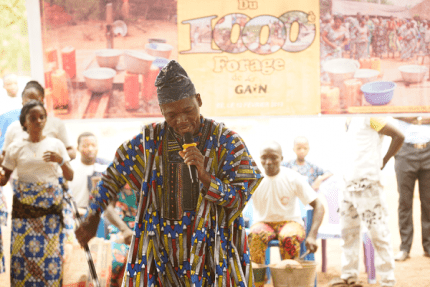
GAiN’s Water for Life Initiative has reached a new milestone – providing 1000 communities with access to safe water in Benin! This translates to approximately 1 million people who have now benefited from GAiN’s water program.
The 1000th village to receive a well is Koudjinnada, approximately 90 minutes north of the largest city, Cotonou. Prior to the provision of the water point, the community relied on three different nearby unsafe water sources, like hand-dug wells or swamps, that are harmful to the community. When we visited, one of those old water wells was closed. Rumour has it that some time ago, someone was fetching water from that well and fell to their death, resulting in the closure of the well. Needless to say, the community was ecstatic when a safe water point was provided in the community.
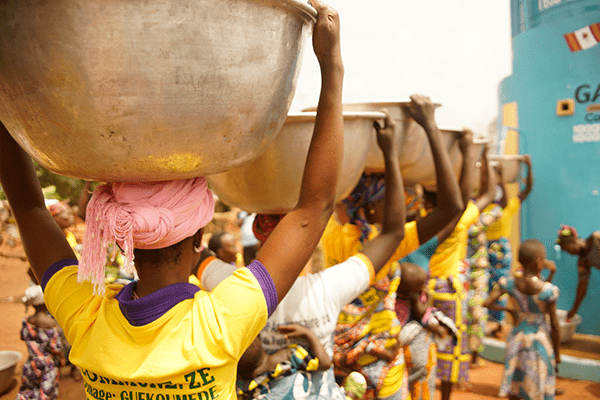
The water point itself is a little different than our normal hand pumps, as it has a water tower connected to an electric generator. Users can just easily turn a tap to fill their basins or jerry cans.
To celebrate this milestone, GAiN hosted a few days of activities in Benin. Some of the GAiN Canada staff, including Ray Sawatsky, GAiN CEO, were present for the celebration. Rod Bergen, President of Power to Change, and some of the other board members and donors, also travelled to Benin to celebrate with GAiN Benin staff.
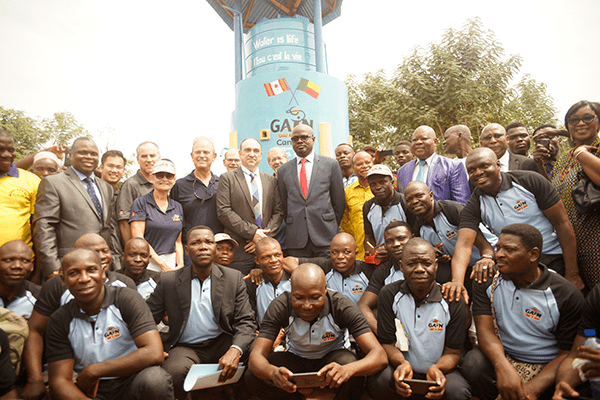
A village celebration was held in Koudjinnada on Feb. 12th, in the presence of Seidou Adambi Samou, the Benin Minister of Water, Mines and Hydraulic, and Francis Loko, the former Benin Ambassador to Canada.
The ceremony featured speeches from different officials, as well as testimony from a woman who shared the benefits of the new water point. The well was officially opened by Benin’s Minister of Water and GAiN’s CEO. Members of the local press were also in attendance.
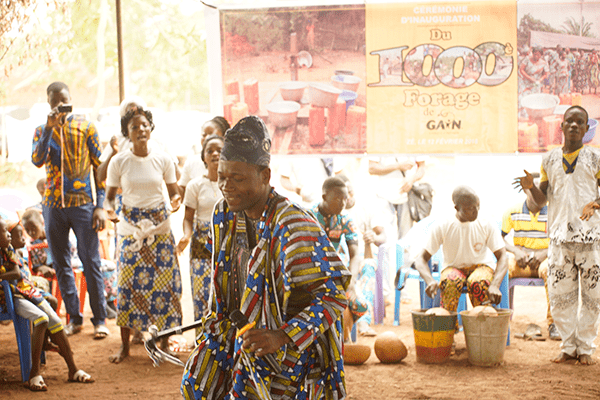
And of course, there was a lot of cultural singing and dancing!
The Celebration was followed by a dinner gala the next day, to remember the past, but also to look forward to the future of GAiN in Benin. The evening had speeches and skit performances by a local performance group.
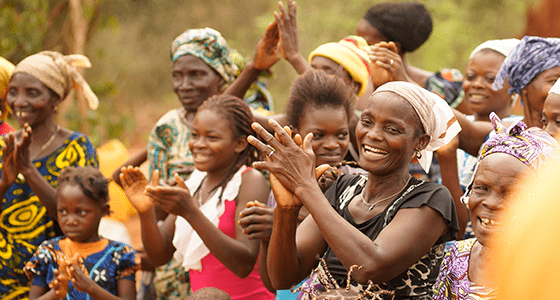
We couldn’t have reached this milestone without you. We thank you for your partnership in providing these communities with safe water sources!
WANT TO HELP BRING SAFE WATER TO MORE COMMUNITIES?
DONATE NOW!
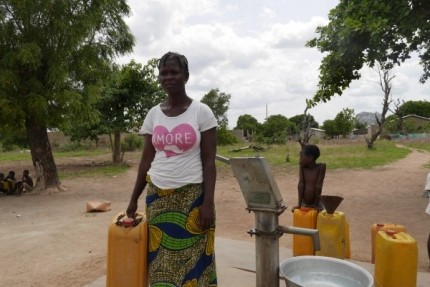
Unsafe water can cripple. It will make people sick. According to WHO, 340,000 children die each year from diarrhoeal diseases due to unsafe water and poor hygiene and sanitation. The effects of waterborne diseases are evident. People are weaker and more susceptible to infections.
Women like Pascalline, from the village of Ayedero Igbo Dogbo, Benin, faced this reality day to day. She would wonder if the day would ever come when she would no longer get stomach aches from drinking contaminated water. It didn’t help that she had to walk several hours uphill to get unclean water to drink – all with a weakened immune system and the stress and pressure of providing for the family.
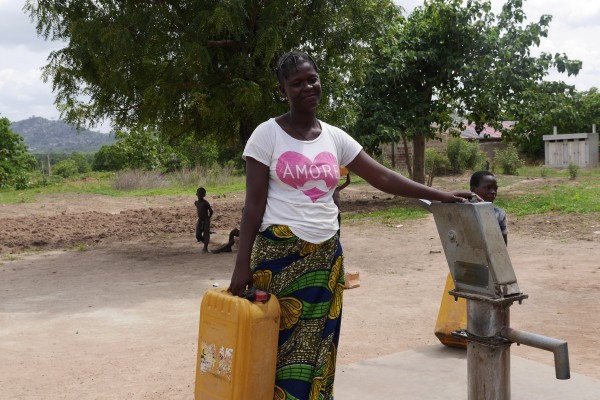
But now that a deep-capped water well has been provided, where Pascalline can access clean and safe water, she has extra time and energy to care for her family. The time she saved can now be allotted to something more productive.
“The water tastes great! It makes me feel better and stronger,” shares Pascalline.
Clean water restores people, bringing them into wellness. It restores their health and dignity – particularly in the case of women. Water gives women like Pascalline strength, power and dignity – encouraging them to dream once again and unleash their potential.
WANT TO HELP BRING SAFE WATER TO MORE COMMUNITIES?
DONATE NOW!
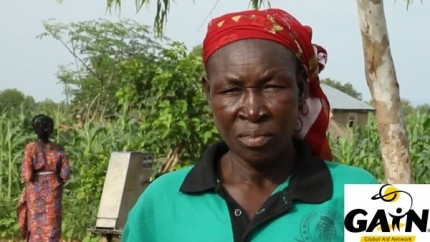
The village of Kouorou, Benin suffered from a lack of water, depending on their only water source – the swamp. The contaminated water from the swamp caused frequent sickness, meaning villagers would spend a lot of time and money in hospitals.
“We would share the same water as the animals,” Marie, a village resident of 10 years, explained. “Cows would walk to the swamp and walk in the water, which was painful to know that I am drinking the same water as them. We just didn’t have any other choice. We felt sad for ourselves because it was giving us sickness.”
Marie still remembers the day GAiN brought a deep-capped well to Kouorou. The people of Kourou rejoiced – celebrating because they knew it would be the end of suffering. “I’m so happy to have this water well in my village,” she said with gratitude.
“There is a big difference between the two sources of water,” Marie declared. “The old one was like mud water and here, this is pure clean water.”
The first change the well has brought is health to the village. Frequent sickness that occurred has slowed down, meaning villagers like Marie get to experience true wellness.
DO YOU WANT TO HELP PROVIDE A CLEAN WATER SOURCE FOR PEOPLE LIKE MARIE? LESS THAN $10 CAN BUY DISEASE-FREE WATER FOR ONE PERSON FOR UP TO 25 YEARS.
YES, I WANT TO GIVE!
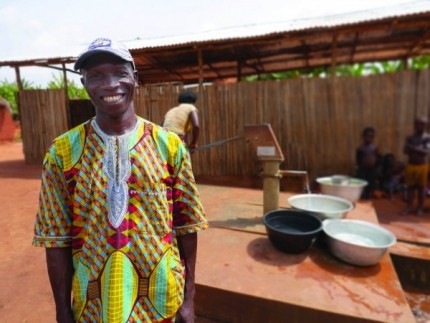
Before receiving a deep-capped well, the villagers of Windjinnawa, Benin knew that the only water available to them was unsafe and could cause them to contract deadly diseases. Still, they drank the dirty water because they had no other option.
“We used to get our water from the swamp,” Village Chief Jacques told the Water for Life Initiative team during a visit in August. “We know that it is not potable, that it is dirty water, but we had no choice. When we drank it, both kids and adults would get sick. Kids have died because of cholera (a waterborne disease).”
Once GAiN provided a well for Windjinnawa, the difference in health was immediate and significant. There was no more sickness caused by contaminated water. Villagers were able to save money because they no longer had to pay for hospital visits or medicine for treatment of illnesses.
“People were amazed,” Jacques recalled the first sight of clean water from the well. “They could not believe it. They were asking, “Is this clean water that is coming out of here?” This is some kind of dream for us. We never thought we would have clean water in our village.”
Since the addition of the well in the village, Windjinnawa set up a system to collect 10 CFA francs ($0.02 CAD) per bucket, putting the money aside for well maintenance and possible future repairs.
“For people [10 CFA francs per bucket] is affordable. The well has brought them so much relief from going to the swamp, which is even farther. They’re happier to pay 10 francs per bucket than going to the swamp.”
Jacques aspires that the village will be able to save enough money from the funds collected to build a water tower, to get water pumped directly to family homes.
Until then, GAiN’s water program continues to make an impact in Windjinnawa households through different community education and health opportunities.
Jacques explained how he and other villagers are implementing what they learned in hygiene and sanitation trainings. He gave the example of putting a lid on the bucket after filling it up with water, and having soap next to it, ready for use.
“We use the handwashing stations and even small children are taught to wash their hands before they do anything.”
Gender sensitivity trainings also made a great impression on him. “When there is mutual understanding between the man and the woman in the house and when you actually apply the teachings in your household, it sure brings peace.”
WANT TO GIVE THE GIFT OF CLEAN WATER TO A VILLAGE?
GIVE HERE
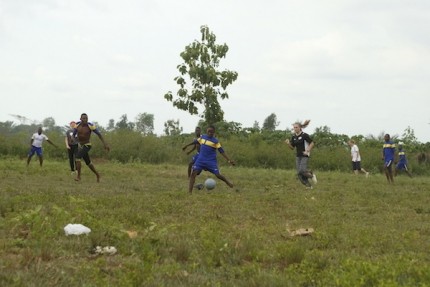
“Sport draws people together and creates community. It’s really neat how just one single soccer ball and an open field can bring people together. You can have a relationship with someone even though you don’t speak the same language.” – Stephanie McDonald, Benin LIFE Team trip co-leader
When sports are used in conjunction with humanitarian work, great things can happen. In May, GAiN partnered with SportAid, a non-profit organization that uses sport as a tool to help impact disadvantaged communities, to organize a trip to Benin with the Trinity Western University women’s soccer team.
The team of 25 women, plus 12 others (coaches, family members and media), flew to Benin expecting an eye-opening and challenging experience.
On their first full day, the team went on a tour of four different villages, seeing the progression of a village without a well to a village with a full-working deep-capped well. They started with seeing firsthand where villagers had to go to get their water — a swamp situated at the bottom of a hill. The sight of a woman gathering dirty water into a basin really impacted the team, many of whom had never left Canada before this trip, bringing the heartbreaking reality of the water crisis right before their eyes.
In the second village, they got to see the well-drilling team at work and ask them questions; while in the third village, they had the chance to witness the flushing of a well. This is a necessary step in the installation process, where dirty water is sprayed from the well before eventually spraying clean water. The transformation from seeing brown and muddy water to clear water was an inspiring sight for the team.
Lastly, they visited a village with a completed well that was in full use.
Some of the team got to help get water for villagers, using the hand pump and carrying water basins on their heads.
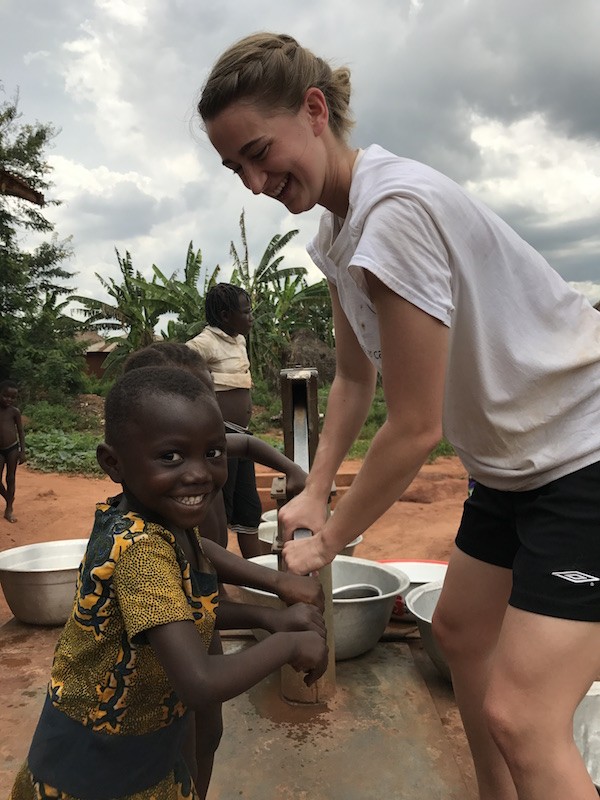
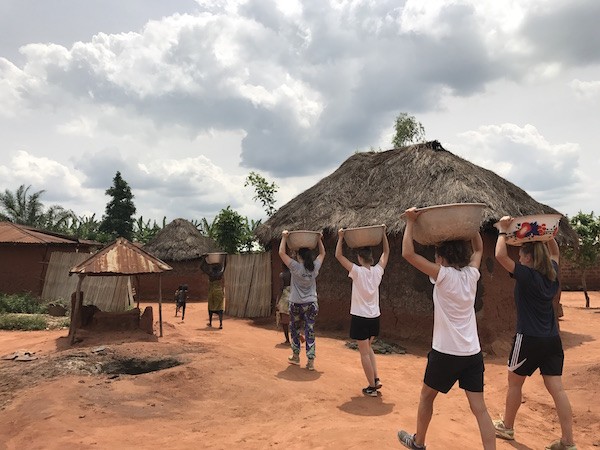
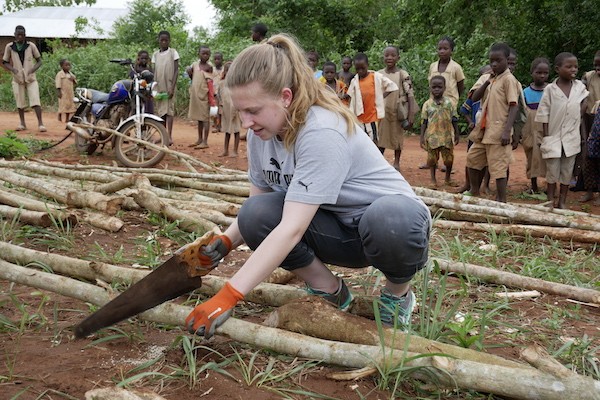
The rest of the trip consisted of soccer games, village chores and construction. The team split up into three groups to build concrete pads for wells and help construct church buildings.
Of course, soccer played a significant role during their time in Benin. The women had a chance to play with the local soccer team (all men), splitting into two mixed teams of women and men, instead of playing against them. Later in the trip, they also played against a local women’s team, further experiencing the power that sport has to break down cultural and language barriers.
“The community speaks the language of soccer even though we have this language barrier,” Brooklyn, one of the team participants, said, recalling a day they played a soccer game outside the house and people gathered around to spectate. “It was so fun to have the community come out and watch us play [even though] they didn’t know us and we couldn’t speak to them.”
It was the relationships that they made with village children that really stuck with the team, McDonald observed.
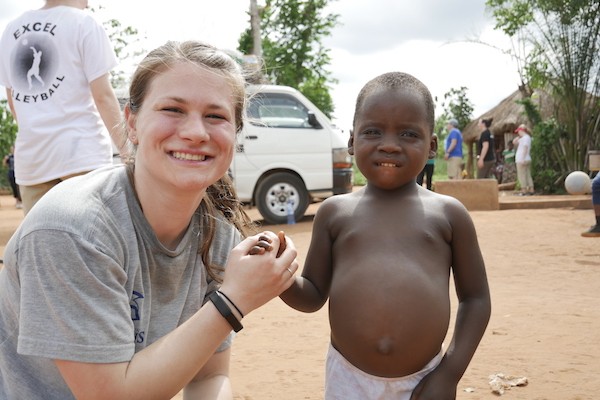
“A highlight with a lot of the women was playing with different kids in the villages and getting to use something that a good portion of their lives is consumed with. Playing soccer can be used to engage and show love to people.”
“It was amazing to see how these kids get such joy out of having a soccer ball,” expressed Brooklyn. “[Something] that brought sheer joy to me was that whenever we brought out a ball, even though there was a language barrier the kids instantly knew we were just playing soccer. [They] split up into two teams.”
The slowed down culture of Africa and the meaningful relationships they made during their short trip inspired the team to be more present in their everyday lives when they returned home.
“They want to make the relationships here, back in Canada, more meaningful through touch and face-to-face,” McDonald explained. “Quite a few women had told me [they] were challenged to bring that aspect back home.”
